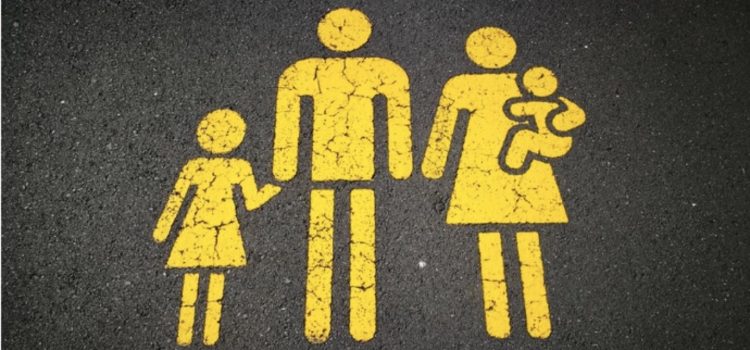
Are non-traditional families inherently poorer than traditional families? Is marriage just for the privileged?
Poverty remains a persistent feature of American life despite the economy being large enough to raise every adult and child above the defined poverty level. The stubborn persistence of poverty has given rise to several false explanations for its staying power, including non-traditional family structures.
Let’s explore the perceived connection between family structure and poverty and Matthew Desmond’s rebuttal.
Family Structure and Poverty
Desmond notes that non-traditional family structures are often held up as a reason for poverty’s endurance. Before we explore Desmond’s arguments for why this isn’t true, it’s worth looking at what advocates of this theory say about the link between family structure and poverty.
The argument is that these non-traditional family structures (for example, single parenthood or out-of-wedlock children) contribute to poverty by reducing economic stability. For example, a single mother must balance working to provide for her family with the responsibilities of childcare. Her income is limited because she can’t work full-time. In this scenario, the non-traditional family structure leads to greater economic instability, stretching the mom’s financial resources thin and making it difficult for her to cover basic necessities like housing, food, and healthcare.
Thus, according to this argument, traditional family structures where two parents share both financial and caregiving responsibilities might provide greater economic stability for the family, as they can pool their resources and share the burden of childcare.
| The Link Between Family Structure and Poverty Although Desmond is critical of the idea that there is a relationship between family structure and poverty, some research does strongly suggest that the two phenomena are at least correlated. One study looking into how different family setups impact families’ financial situations during the first five years after having a child showed that married couples tend to have the best financial well-being. This was followed by couples who are living together but not married, and then single mothers. However, when families go through breakups, like divorces or separations, it often leads to a drop in the mother’s financial situation. Conversely, if a single mother enters a new living arrangement, especially one involving the child’s biological father, it can lead to an improvement in her financial situation. These results apply across different ways of measuring financial well-being, such as household income, income relative to their needs, and struggles to afford basic necessities. Some factors may contribute to the financial advantages of married individuals. Married couples often benefit from the combination of two incomes, which can lead to a higher overall household income. This shared income allows for greater financial stability and flexibility. Similarly, married couples can share household expenses, such as rent or mortgage payments, utilities, and groceries. This division of costs can lead to significant savings compared to individuals living alone. Finally, the tax code provides certain advantages to married couples, such as the ability to file joint tax returns, which can result in lower tax liabilities and higher take-home pay. |
However, Desmond raises some objections to the theory that non-traditional family structures contribute to poverty. For example, he notes the lack of a link between family structure and poverty in other countries and the fact that marriage and family formation are steps people take after they’ve already achieved a certain level of financial stability. Let’s explore each of his objections in detail.
1) Non-Traditional Families Aren’t Inherently Poorer Anywhere Else
Desmond observes that changes to the traditional married, two-parent family structure aren’t inherently linked to poverty in other countries. If it was a universal truth that non-traditional family structures led to poverty, we would expect it to be a global phenomenon.
Desmond writes that America’s key difference is a lack of childcare options, which governments do offer in other wealthy, industrialized nations. This is what makes it nearly impossible for single parents to work full-time, meaning they’re unable to reach their full earning potential—making it far more likely that they’ll wind up in poverty. In other words, being a single parent isn’t in and of itself what makes someone poor—being a single parent while having to pay for or provide childcare with minimal assistance is what makes someone poor.
| The Childcare-Poverty Link Some scholars support Desmond’s argument for a link between the poverty of single parents and the lack of affordable childcare. They draw a contrast with free college education, noting that while access to higher education is valuable, affordable childcare is even more crucial in addressing poverty and promoting economic mobility. Some proposed solutions to the lack of affordable childcare include subsidies and financial support for childcare, expanding programs like Head Start and universal Pre-K, mandating employers to provide on-site childcare services or give childcare subsidies as part of benefits packages, and enhancing tax credits for childcare expenses. On the other hand, some research out of Australia may cut against Desmond’s argument that the relative poverty of non-traditional families is a uniquely American phenomenon. The research highlights the financial vulnerability of women following separation or divorce, observing that when women separate from their partners, their risk of falling into poverty significantly increases. Indeed, the Australian data found that the probability of women living in poverty more than doubles in the year after separation. This vulnerability is attributed to various factors, including the gender pay gap, disrupted employment due to caregiving responsibilities, and the challenges of managing households independently. |
2) Poverty Prevents Family Formation
Desmond further writes that those who cite non-traditional family structures as a reason for poverty’s staying power get the causal relationship wrong. People aren’t poor because they don’t start families; they can’t start families because they’re poor.
According to Desmond, it requires a certain level of financial stability to get married in the first place. When individuals or couples are struggling to make ends meet, they may delay or forgo marriage and starting a family because they believe they lack the financial resources to support a family. This can be particularly pronounced in communities with high living costs, limited job opportunities, or inadequate social safety nets. In other words, writes Desmond, marriage and family formation is something people do after they’ve achieved a certain level of financial stability. It’s a marker of prosperity, not a cause of it.
(Shortform note: Other writers have noted that marriage in America has evolved into a privilege for the wealthy, marking a stark departure from the past. Marriage now tends to be concentrated among more educated and affluent individuals, who often enjoy more stable financial lives as a result. While marriage rates have declined across all income groups, they’ve declined far more for poor and working-class Americans than they have for wealthy Americans, and the “marriage gap” between the groups is much greater than a generation ago. Today, 26% of poor, 39% of working-class, and 56% of middle- and upper-class adults aged 18 to 55 are married; compared with 51%, 57%, and 65%, respectively, in 1990.)

———End of Preview———
Like what you just read? Read the rest of the world's best book summary and analysis of Matthew Desmond's "Poverty, by America" at Shortform.
Here's what you'll find in our full Poverty, by America summary:
- Why the United States suffers from so much poverty and inequality
- How some Americans benefit from the poverty of others
- How we can empower the poor and eradicate poverty






